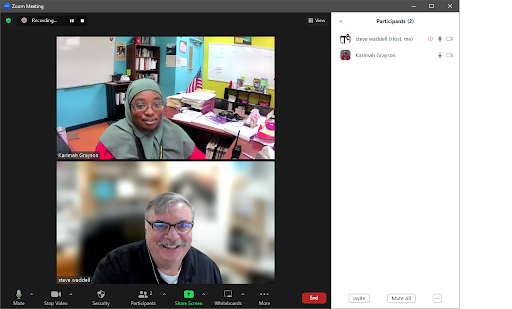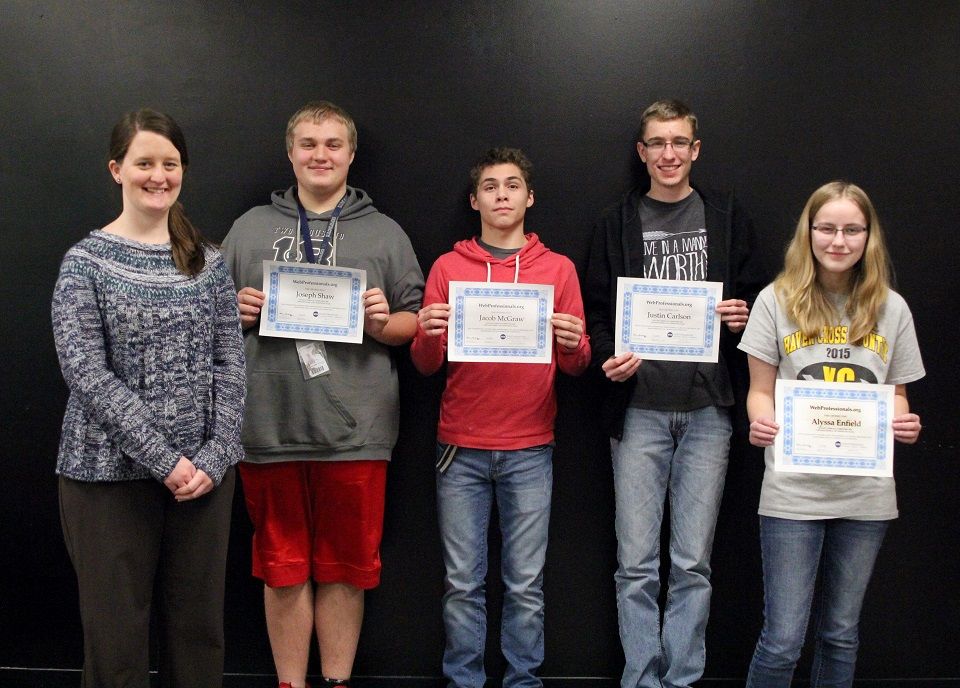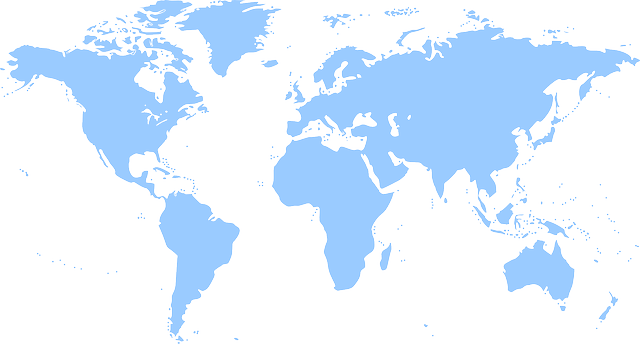Blog
Highlighting a Success Story at a Florida Public Charter School
Today we are highlighting one of our teachers, Karimah Grayson of SunEd High School in Margate, FL. SunEd High is a public charter school serving students for whom the traditional high school model may not be the best fit. SunEd students earn their full high school diplomas, not GEDs. SunEd High School adopted the courses after the principal Tammy Lara and her team vetted the courses and determined the curricula to deploy.

Today we are highlighting one of our teachers, Karimah Grayson of SunEd High School in Margate, FL. SunEd High is a public charter school serving students for whom the traditional high school model may not be the best fit. SunEd students earn their full high school diplomas, not GEDs. SunEd High School adopted the courses after the principal Tammy Lara and her team vetted the courses and determined the curricula to deploy.
Karimah teaches CTeLearning’s Web Design, Web and Computer Animation, and Web and Mobile Game Design courses to over 100 students in both morning and afternoon sessions.
Karimah loves that the professionals featured in the courses are diverse and help her students see themselves in their career pathways. We caught up with her as well as one of her students to hear about their experiences working through the courses.

Teacher Perspective
What have the students enjoyed about the learning experience?
They really like being able to move in their own time and not have to move together as a class, because everyone learns at their own pace. I will use the Web Animation course as an example. The curriculum lets students create their own animations. Their projects, animations, music, sound effects files and portfolios reflect their personalities and their skills. They can see all their choices they made in their creative work.
I know this may seem simple, but for example, in the Web Design course, they are doing their first HTML code with the “Hello World” project. My students get so excited when they see that the code they created is popping up in the browser. Again it may be such a simple thing, but in each of your curricula, the students are creating things right from the start. It engages them, and it shows them success immediately. They know they can do it. So it shows them that something is going to happen in the class and it is going to be exciting. It is tangible evidence that what they’re doing is working.
What do you tell your students about the importance of education?
I tell them that although not everyone ends up going to college, but all of you must become lifelong learners. I let them know that there are careers that were not even thought about when I was in high school. I graduated high school a long time ago, back in the 1980s, and there was no game design or web design. So what I tell my students is important. I teach them about how each of the programs that they’re in can lead them to entrepreneurship. I make sure they understand that they are learning skills that transfer to any career. So even if they are not interested in going to college, or working with someone, they have a skill set that they can bring to others.
And here is how I make this sink into the teenage mind. I tell them to look around, right now in our class, you can see that you have a network of others who are learning new skills like web design, animation, and game design. I tell them that there may be a famous tech company starting right here in our class. Nobody says you have to work for someone else. Be an entrepreneur. Think of the power sitting here in this room right now. So that’s one of the things that I’m encouraging, in addition to using all the project-based curriculum and software that is provided. I toss in some inspiration.
Can you give us an example of one of the projects your students have worked on?
The real world is multidisciplinary. For example, look at the Flying Monkey project. What I did for them is talk about the project. I laid out what we are going to do, and then I asked them who had taken their physical science class yet. Then I show them that this project is really real-world physics in disguise. I tell them I know none of them have taken physics, but they have the physical science in their hands with the monkey and protractor. I said, this is what you learn. It is a fun project and they do the data collection, graphing and analysis. By the way, I was the worst at flinging the monkey.
I had them pick their teams, assign the team tasks and do the experiment. They were doing science and analysis and loving it. I mean how often do you get students enjoying collecting, analyzing and using data? The real fun happened a few lessons later, when they were building a game with a frog that was flying through the air. At that point it all came together for them about how science is part of building games. There were light bulbs going off all over the place, which is what every teacher lives for.
What do your students enjoy about hearing from industry professionals in the courses?
I know the students like seeing the videos of different professionals, because we have a very diverse student population. The diversity of career professionals helps the students see, “I can do this too.” They can see themselves in the faces and voices of all the professionals you have in every one of your courses. You may not realize just how important that is.
What are your students learning about entrepreneurship?
This is very important these days, because a lot of students are looking into entrepreneurship. I think that is a good thing, because, as I say, our country was built on entrepreneurship, and what I do tell them about entrepreneurship, you still have to have to be professional. Because if you are an entrepreneur but not professional, you’re just gonna be an entrepreneur and probably a broke one at that. Entrepreneurs have clients and customers, and have to earn money from someone. We must always remember that we are in service to others.
What do you teach your students about being lifelong learners?
My students tell me I have a catchphrase, which is “figure it out.” Something in a project happens, and they struggle with something. I say, look, we have all been here, it is confusing now, but we’ll figure it out. Your team will figure it out. I mean, because we will work it through and see. And that’s what I’m trying to share with my students. I won’t always be there for them. I need them to think for themselves if they are going to succeed and do well for themselves and their families. The combination of all the videos, text, images, and animations really helps my students figure things out. It is a confidence builder. They use the tools and info to solve the problem. They build self-esteem here in my program, one “figure it out” at a time.
How has your experience been working with CTeLearning?
I really appreciate the support. Because multiple times I’ve messaged you, every five minutes, oh, I need this. And you get on it, you identify what I’m asking, and you make it work. And not only do you make it work, you communicate back with me that it’s been done. You’re very approachable. And if something is needed, you will provide it for me. I even appreciate that we got the onboarding when we first started, and you had the live introduction with both sets of my students. So I am very thankful for the support.
Student Perspective
What do you like about that course?
I like the idea that I can make my own games. I’m getting the basics. As I’m building, I learn where to start, how to be a professional, set the game mechanics, set the pages, make the sound effects, music, and characters. I am even learning how to build a company and sell my games.
What do you think about all the professionals you’re meeting in the course?
They’re really helpful. I like the idea of having them in there. Hearing what they think is important. They give you certain ideas and help you think outside the box. They also make you think outside the box for yourself. You are getting their wisdom and using it.
Is there anything you’ve been learning in your game design class that you’ve taken and applied in some of your other academic classes like math or others?
Actually, it has. We do so much in Ms. Grayson’s class. We are doing math, science, and writing because it is what you do when you are making games. I don’t remember exactly what it was, but yesterday I was in another class, and I was doing something, and I was like, “Oh, wow, I did that before in my game class.” Ms. Grayson’s class makes it all real to me.
What do you want to tell your teacher and the administrators who made it possible for you to take this class?
I would like to say thank you to Ms. Lara (Tammy Lara, Lead Principal and Director of Education) and everyone else who made this course possible for me and my classmates. I don’t feel like just saying thank you will be good enough. I feel like there should be more than just saying thank you. Because, like, it takes a lot for them to just do all this for us. So a lot of appreciation is coming to them. They didn’t have to get this set up for us, but they did, so that means a lot.
Are you going to try to get the industry certification?
Yes I am working hard to earn my certification. Ms. Grayson has told us how certifications help set us up for our futures. This class makes me feel good. I will have more than just my high school diploma, because this is something that will set me apart. Whatever I decide to do for my work and my career, I will have this. I mean, I am already here at school. This opportunity is here. So, instead of doing nothing, I am doing something for myself and my future. Yeah, it’s a lot of fun. So I’m enjoying it.
Get in touch with us today!
You can book a demo directly using Calendly, call us directly at 913-764-4272 or 877-828-1216, or submit the form below and we will reach out to you.
We look forward to helping you and your students.

Most Recent Posts


About Us
Whether you are a big institution, small school or an individual seeking a new career path, our curriculum is for you.
Request a free demo of our curriculum today to see how you can help fuel our future world.
Get In Touch
PO Box 398 Olathe, KS 66051
hello@CTeLearning.com
Phone: 913-764-4272
Toll Free: 877-828-1216
Fax: 866-307-8112
Email: info@ctelearning.com
Quick Links
All Rights Reserved | Support Learning, Inc.
Web Design by Tekkii


